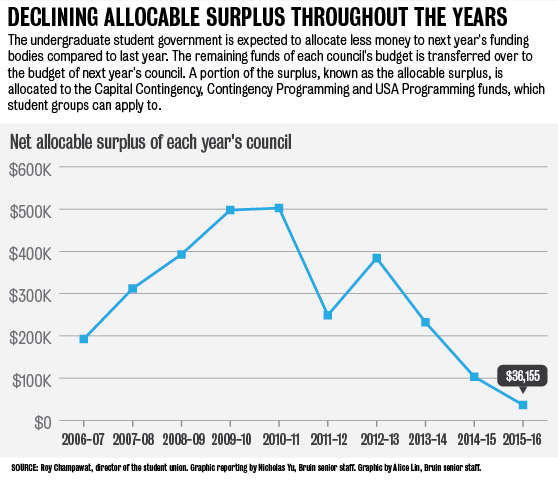USAC surplus funds for student groups continue to decrease

By Nicholas Yu
Jan. 21, 2016 1:22 a.m.
Surplus funds the undergraduate student government can allocate to student groups continue to decrease from about $100,000 last year to $36,000 this year.
Heather Rosen, president of the Undergraduate Students Association Council, said this year’s surplus amount is low because council members aimed to put as much money as possible into programs and funds that benefit students.
Roy Champawat, the student union director, said he thinks the student government’s net loss of $152,000 from hosting the JazzReggae Festival is one of several reasons the surplus is unusually low.
Surplus, the amount of money each year’s council does not spend, is comprised of allocable surplus, or funds the council can reallocate, and restricted surplus, or funds the council cannot reallocate.
The council deducts its expenses and adjusts for inflation to calculate the year’s surplus. Student groups forfeit unused USAC-allocated funds, which also contribute to the surplus amount.
Most restricted surplus funds include provisions that require them to be used for specific purposes, Champawat said. For example, money in the Green Initiative Fund must be used for sustainable programs or be saved for later programs.
The council has historically distributed its allocable surplus to funding bodies that fund student activities, such as the Contingency Programming, Capital Contingency and USA Programming funds. Allocable surplus funds can also be invested into an endowment with a 5 percent return. The endowment fund was established in 2013 at $100,000 and currently contains $120,000.
Debra Geller, a USAC administrative representative, said the previous allocable surplus was higher in the past, partially because student groups used to spend less of the funds they were allocated and were less knowledgeable about funding deadlines.
Finance Committee Chair Stephanie Wong said she thinks it is difficult to pinpoint other reasons for the decreasing surplus because many factors contributed to the council’s expenses and profits.
Rosen said she thinks the decrease in student group funding is an issue, but doesn’t think student groups should view the surplus allocation as additional student funding because its amount fluctuates significantly from year to year.
Rosen added the purchasing power of student fees has also decreased because the fees were not tied to inflation. For example, the $30 membership fee each student pays has not changed since 2002, but the fee could bring in an additional $1 million if it were tied to inflation, she said.
Council members will vote on how to allocate the surplus at their next council meeting Tuesday.


